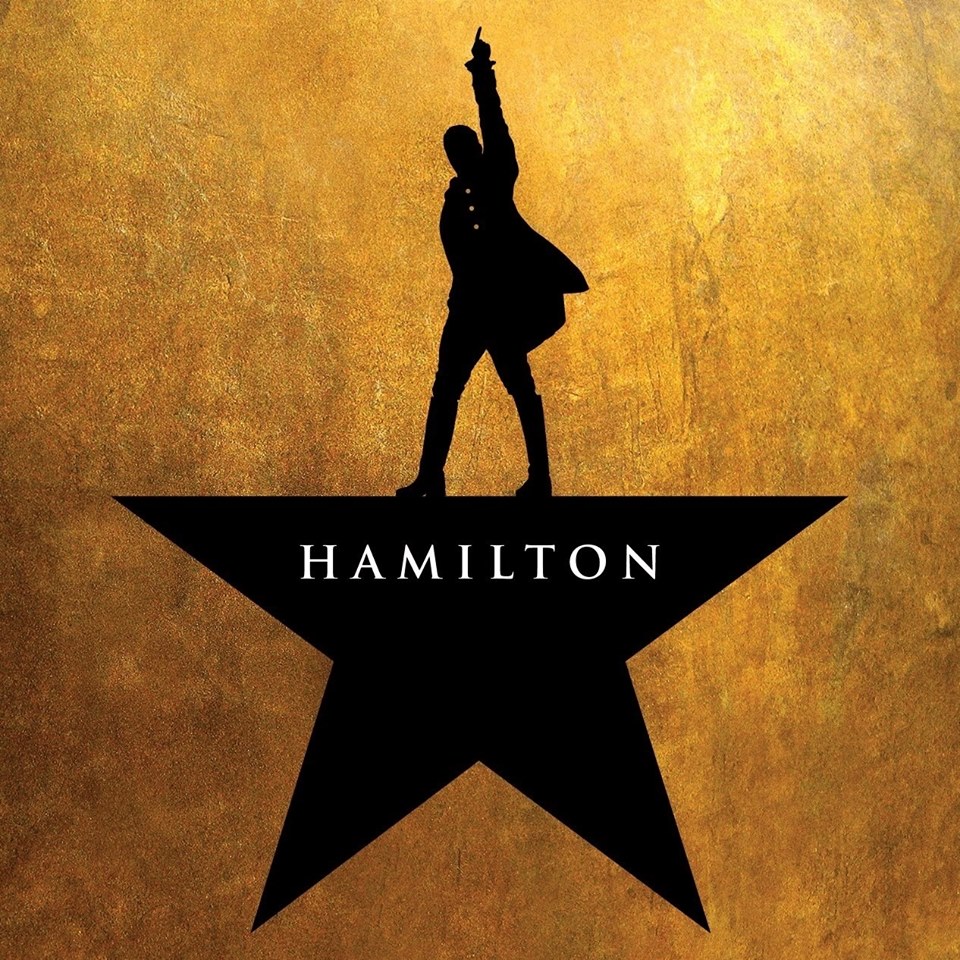Lin-Manuel Miranda’s Hamilton truly is the musical for our turbulent times. Set against a backdrop of the American Revolution, the characters rap, beatbox and sing their way through history. It’s won countless prestigious awards and is watched by crowds across the world, selling out up to a year in advance. In fact, it’s taken the internet by storm, and is almost universally adored. But while the show was immensely enjoyable, it felt as if there was something missing.
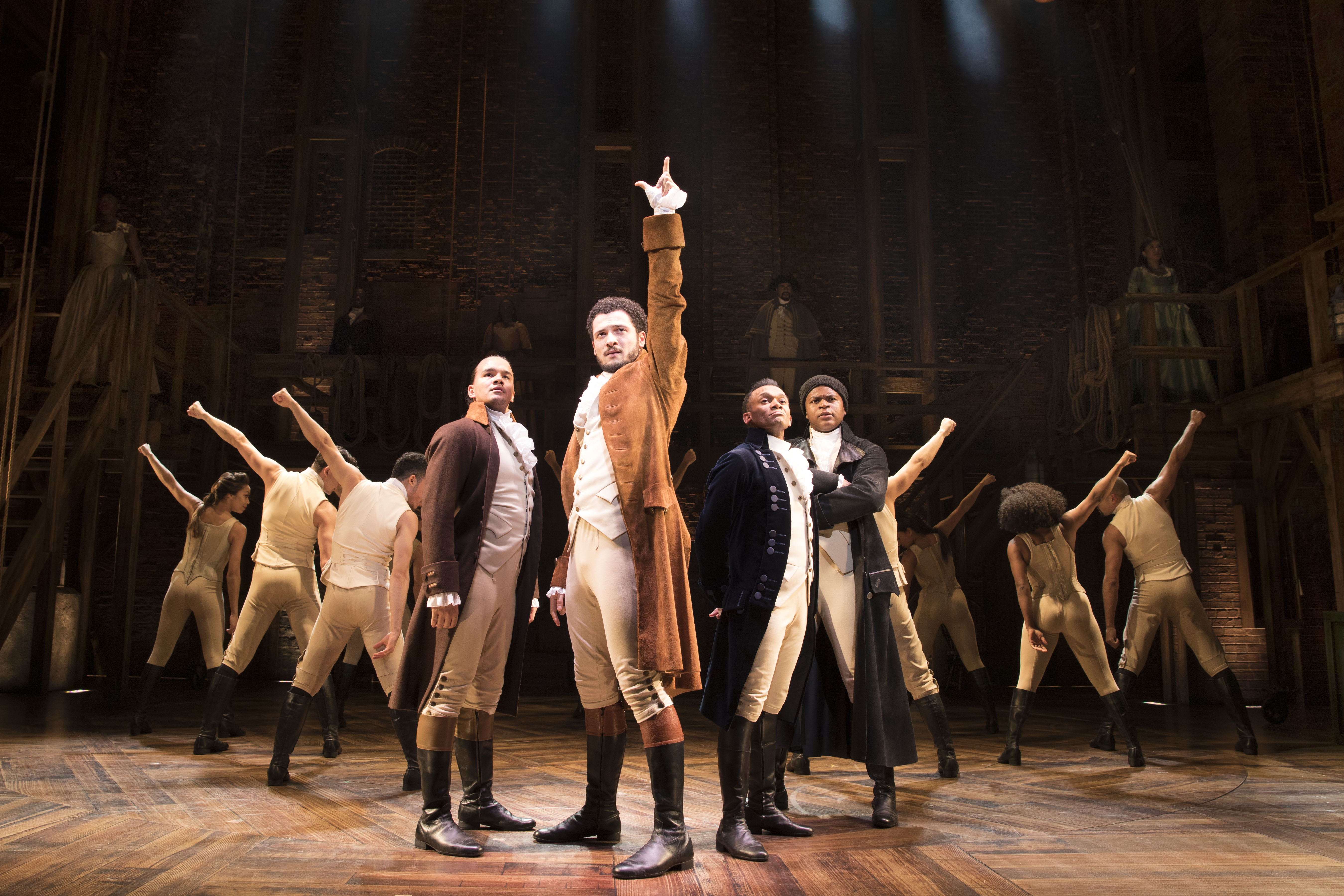
The London cast of Hamilton, starring Jamael Westman as the title character
Our hero is Alexander Hamilton, one of America’s youngest Founding Fathers. Along with his contemporaries George Washington, Thomas Jefferson and others, Hamilton successfully rose up against the British occupiers to win freedom for the US. But that wasn’t all to his story – unlike the other Founding Fathers, Hamilton was an immigrant, he wasn’t born on US soil. Indeed, he was a white settler from the Caribbean who had come to America to seek his fortune. The musical makes much ado about this, portraying him as the underdog who took on the world – and won. The show charts Hamilton’s astronomic rise through American history, the success of the Revolution, and how he manoeuvred through politics to get ahead.
Importantly, the cast is truly diverse. The show’s creator, Lin-Manuel Miranda, actively sought to cast actors of colour in the lead roles, giving them opportunities rarely open to them in the elite world of theatre. Many of America’s Founding Fathers are excellently portrayed by black, Latino and Asian thespians. In fact, there are only a few white actors in the entire production – the most prominent playing King George III. This policy of positive action is truly revolutionary, helping to mitigate many of the socio-economic issues that frequently work against actors of colour. In an era when the far-right is on the rise, Hamilton rebukes racism, proving that not only are non-white actors capable of performing white roles – they are capable of selling out theatres.
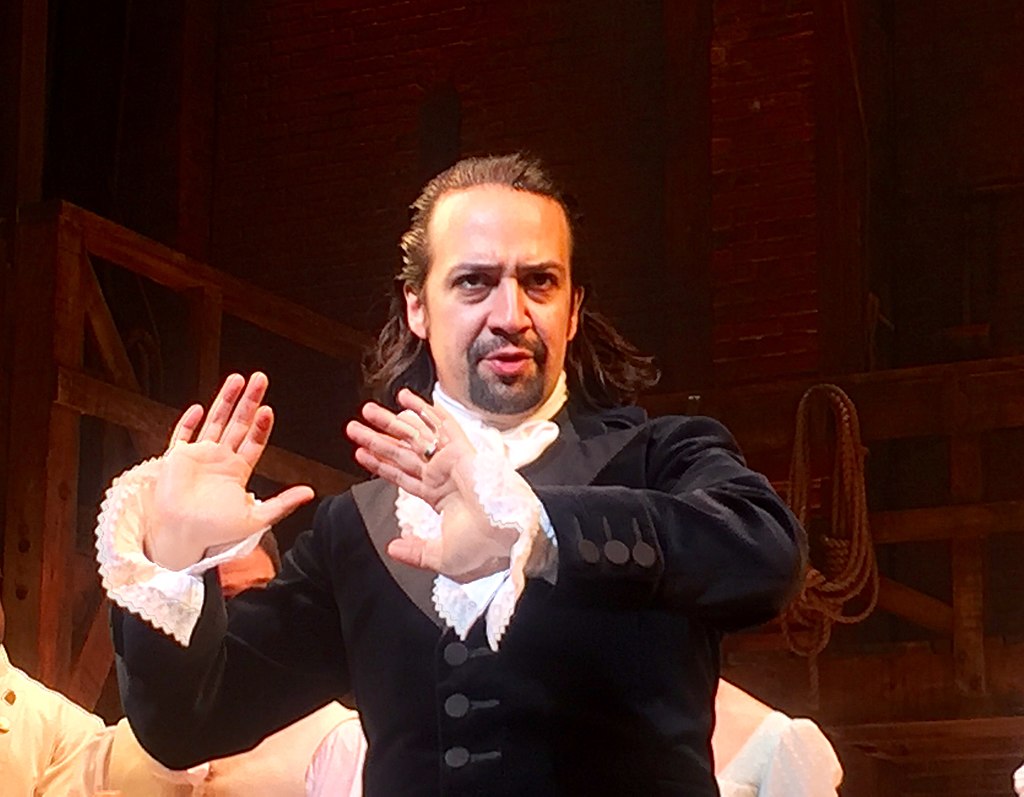
Lin-Manuel Miranda playing the title character, Alexander Hamilton
The music injects something innovative and refreshing into the somewhat stale world of musical theatre. A mix of rap, hip-hop, soul, blues and traditional theatrical styles, each song brings something different to the table – there’s always something new around the corner. But musical motifs run throughout the production, in order to keep the audience grounded and give them a reference point for certain characters. For instance, George III has his own style, moulded by 1960s Britpop – just so you know the King is on his way. As for the lyrics, they’re not what you might expect – there’s no questionable rhyming or space-filling noises here. You’ll find some bad language, but it’s never overly vulgar. Each line is sharply crafted, telling Hamilton’s story in a way that’s both entertaining and accessible.
Naturally, the show has taken the world by storm. As well as being sold out, the audience inside the theatre cheered louder than ever before, so much so that at the end of every single song it almost felt as if they were about to give it a standing ovation. The internet loves it, too. It seems as if the show can do no wrong.
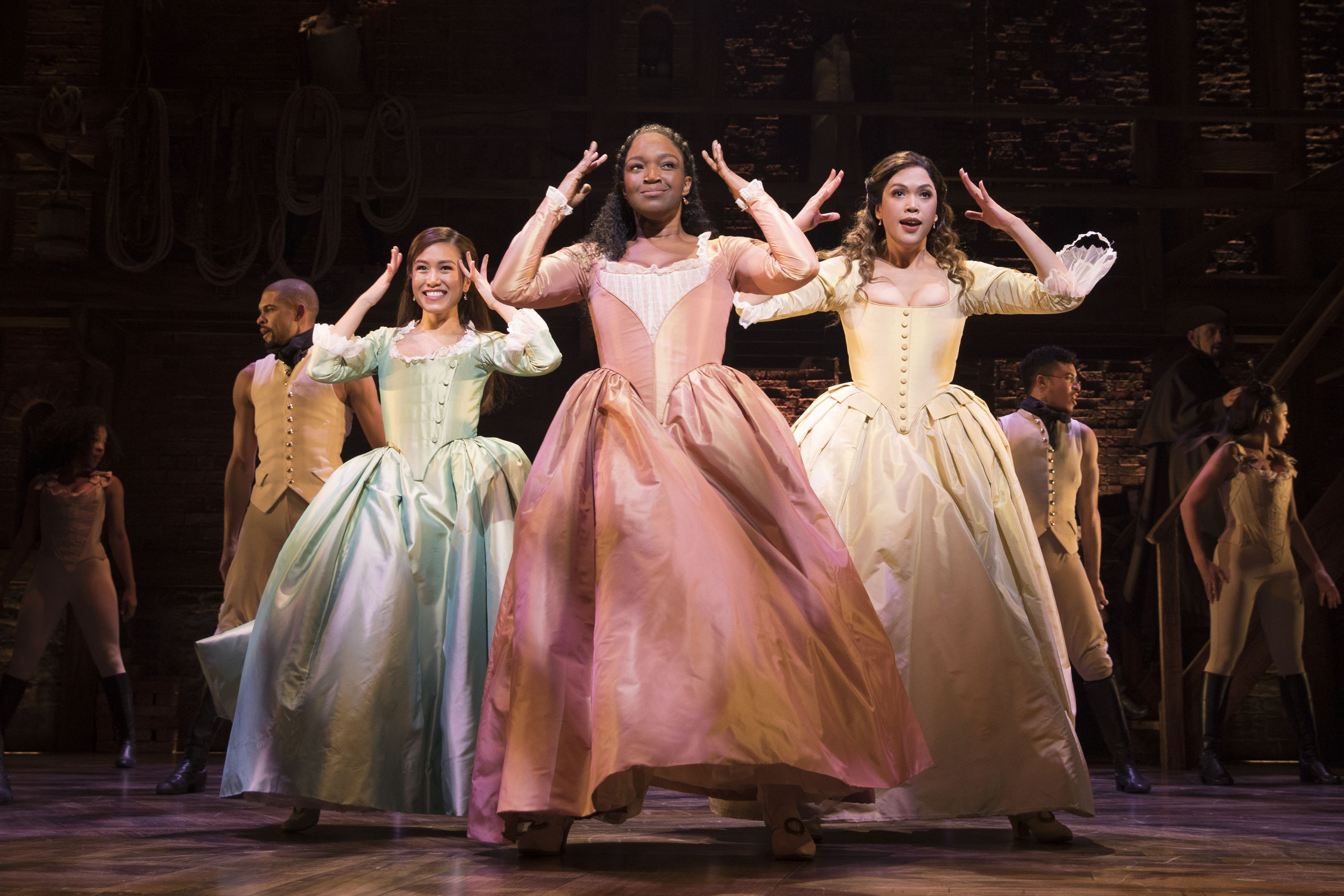
Rachelle Ann Go as Elizabeth Schuyler, Rachel John as Angelica Schuyler, and Christine Allado as Peggy Schuyler
But in spite of the show’s progressive strides, one thing stands out as being fundamentally stuck in the past. The women in the show are relegated to the background, acting as mere embellishments to what the show’s really about – the male character of Hamilton. Yes, the Schuyler sisters are strong and independent women, but a closer inspection reveals them to be nothing more than tired, well-worn stereotypes. Firstly, there’s Angelica – the eldest sister who gives up on her love for Alexander to marry rich, but mourns him for the rest of her life. Then there’s Eliza, who does marry Alexander, but gladly relinquishes her individual identity to play the difficult role of his loving, supporting wife. Peggy Schuyler barely has more than a few lines, and the actress that plays her doubles in another role – Maria Reynolds. This is the woman Alexander had an affair with, which almost ruined his career. Maria – unimaginatively wearing a red, low cut dress – is the typical ‘seductress’, who uses her good looks and sultriness to get what she wants, i.e. Hamilton. But it’s her husband that is pulling the strings behind the scenes, using his wife’s adultery to blackmail Hamilton.
Angelica is the unlucky-in-love elder sister, whose life seems unfulfilled because she did not get the man of her dreams. While she is by far the most developed female character, played by a series of incredible black actresses, she makes only one allusion to the show’s major problem – “We hold these truths to be self-evident, that all men are created equal. And when I meet Jefferson, I’mma compel him to include women in the sequel”. But it’s 2018, and we shouldn’t have to wait for the sequel. Women were actively involved at every stage of the Revolution, and while it’s impossible for the show to tell all stories, there’s no reason it couldn’t have made its female characters well-rounded and complex people, as it has the men. While Eliza is given the honour of the closing song, which describes how she told her husband’s story to the world, it feels like too little too late. She lives fifty years longer than Hamilton, and all her achievements in that time are reduced to a couple of lines. Ultimately, she and the other women are there to serve as props to their menfolk.
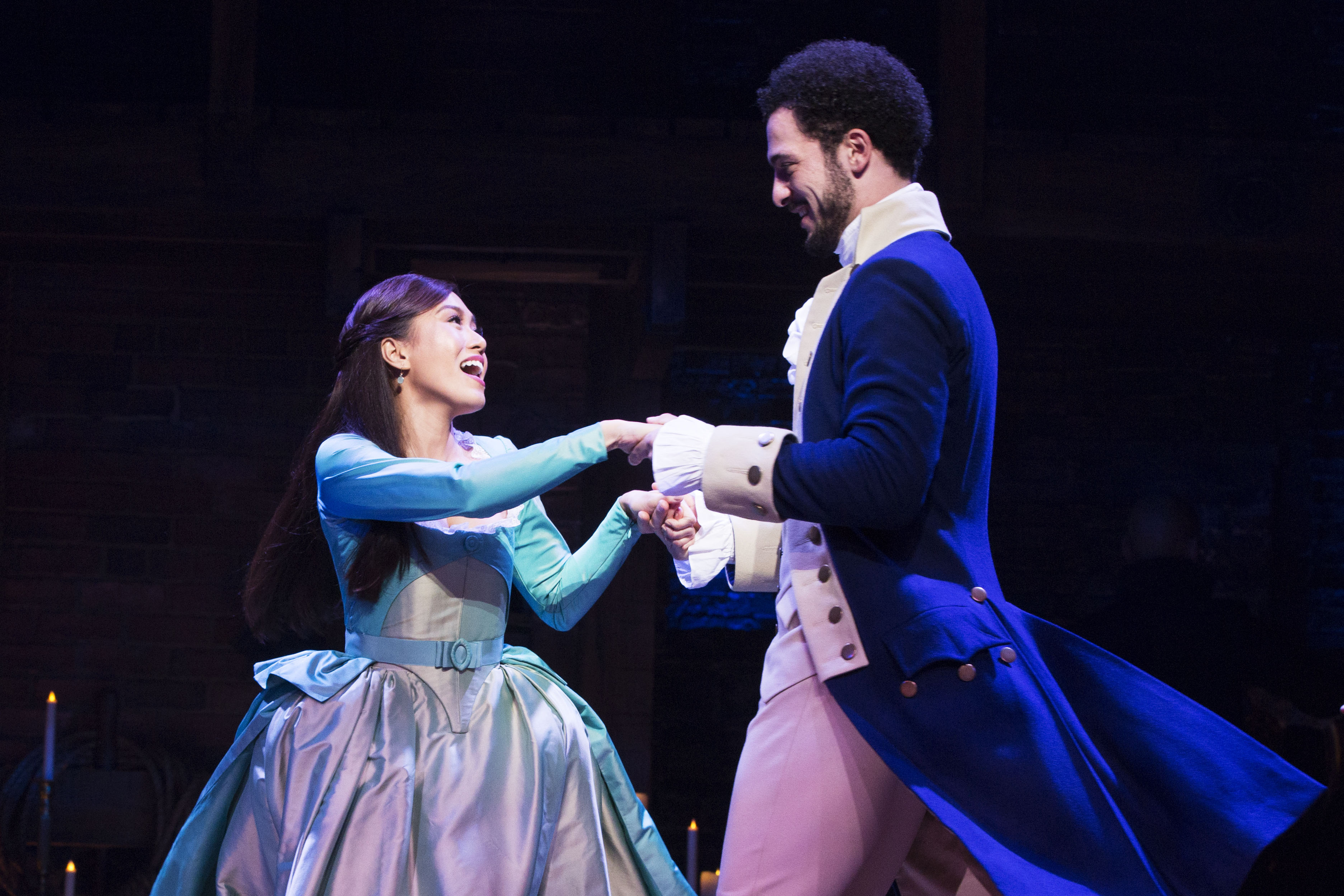
Elizabeth Schuyler, dancing with her husband Alexander Hamilton
As well as this glaring misstep, it fails to challenge the nature of the Founding Fathers. While it’s critical of Jefferson for owning slaves, Hamilton himself worked for a company that traded in human property, which it does not discuss. It doesn’t appear to question the Revolution or its limitations, either – it firmly stuck to the age-old view that early America was a great place of liberty and freedom for all, without mentioning that this privilege was largely limited to wealthy, white men. Surely, 250 years later, it’s time that the accepted perspective on the revolution was challenged and scrutinised?
But for many, that is neither here nor there, as the musical doesn’t necessarily enhance a limited knowledge of the American Revolution in the first place. While audiences in the US may know their own history, global and British audiences might be left scratching their heads, if they aren’t familiar with the formation of the US. It presumes a lot of knowledge – some have said it was quite difficult to follow, as the pace is very fast and the lyrics not always discernible. Reading up on Hamilton and co. would easily solve the problem, but that should not be a requirement for theatregoers paying a minimum of £40 a ticket.
To sum – is Hamilton one of the best musicals around? Absolutely. Is it worth the money? Especially if you can get cheap seats. Is it revolutionary? Yes, and how incredible it is to see people of colour taking the lead. But that doesn’t mean we should be entirely uncritical of it. It’s a coup, but it’s not quite there yet. In failing to truly represent an entire gender, it could leave its female audiences feeling invisible – which is disappointing in a show that’s been touted as the most forward-thinking production around.
